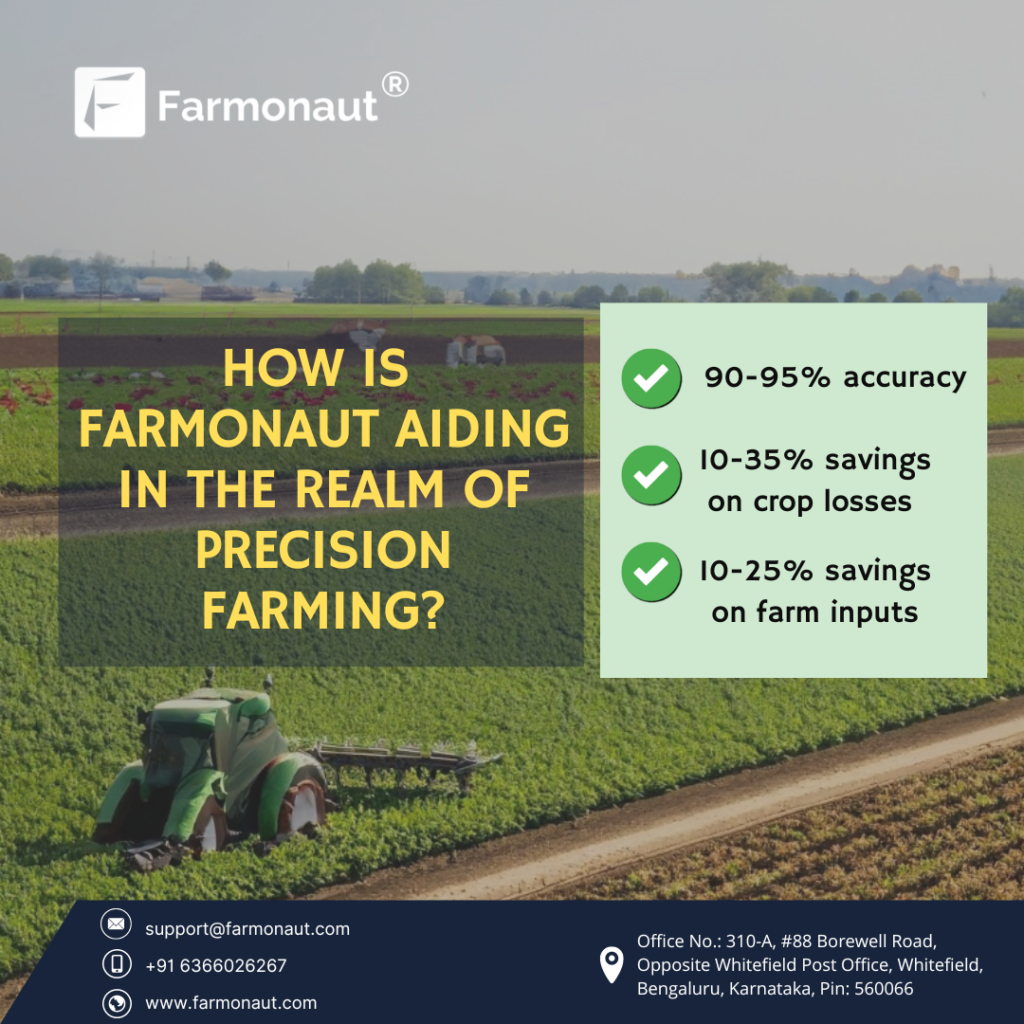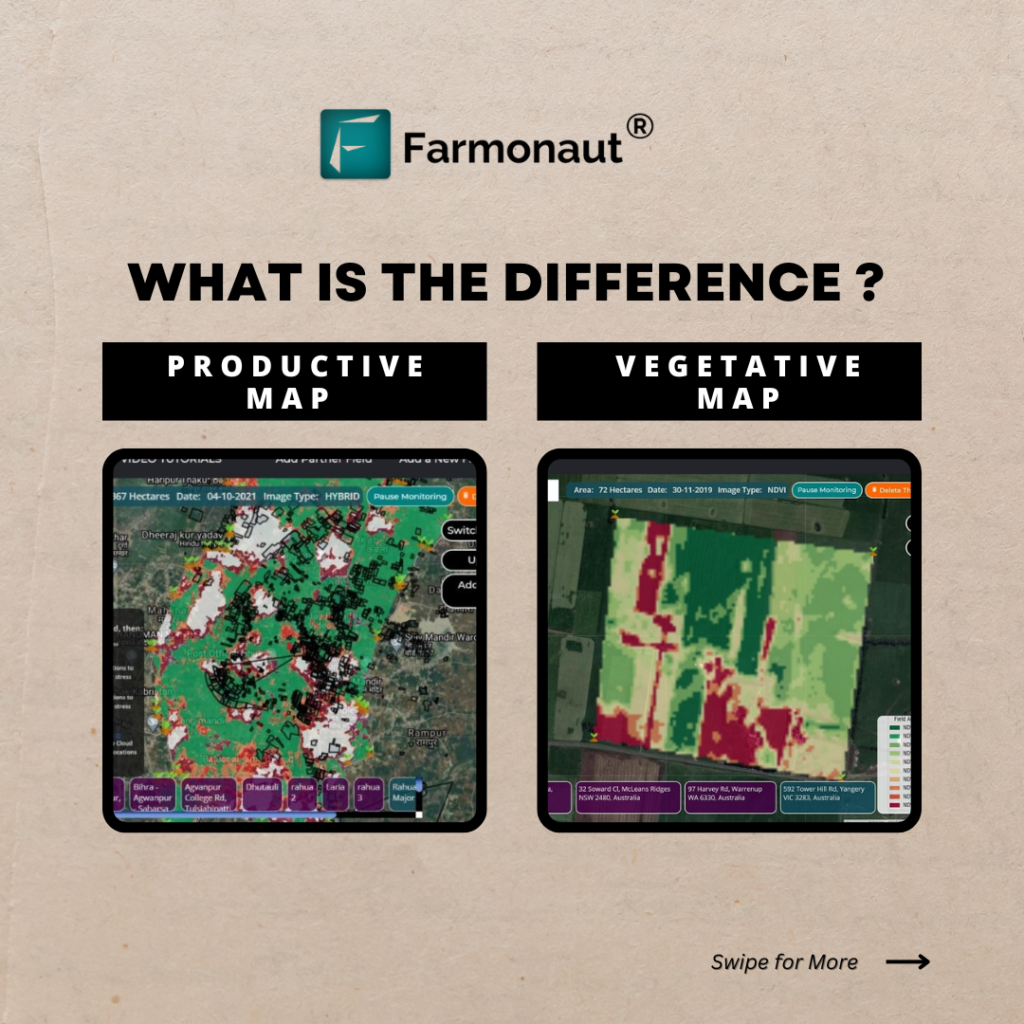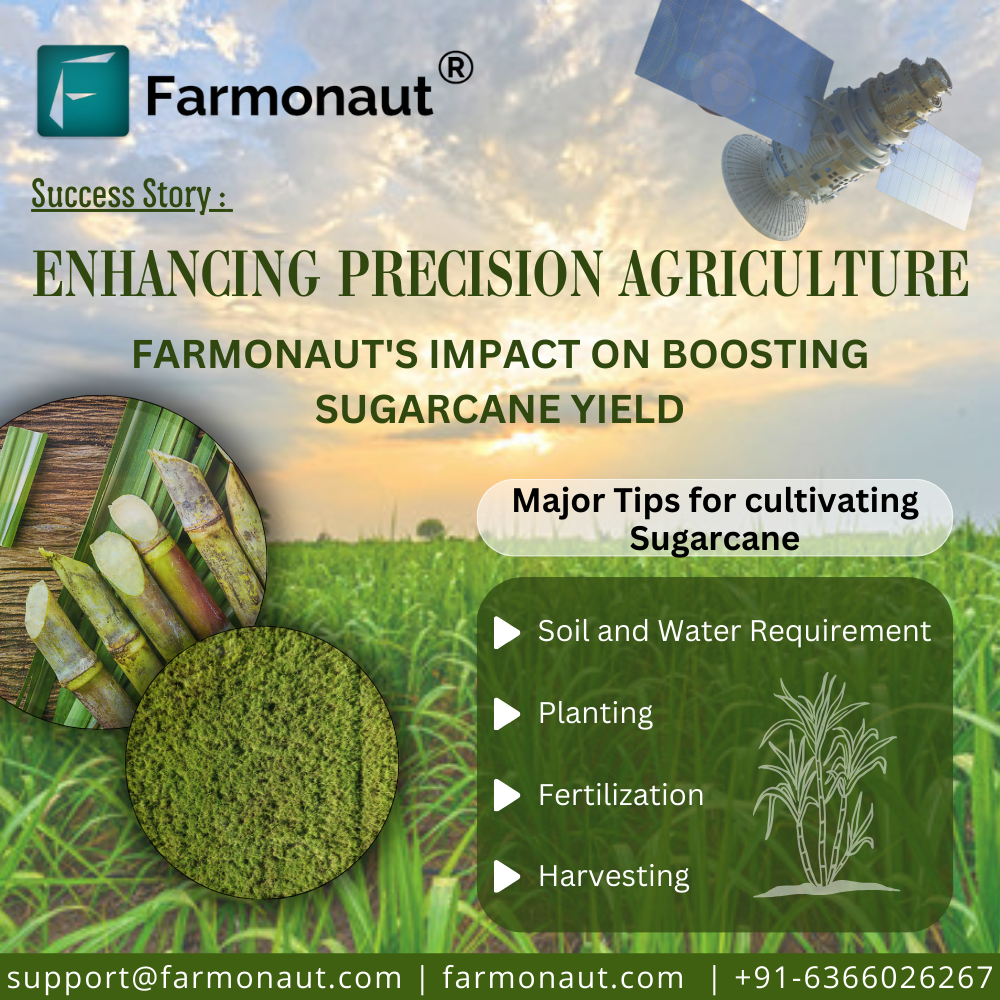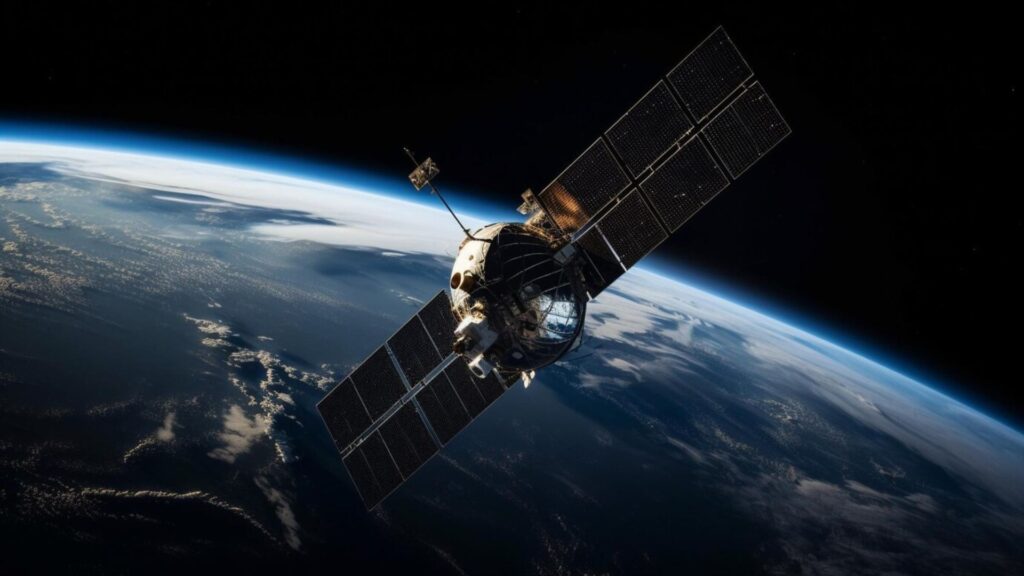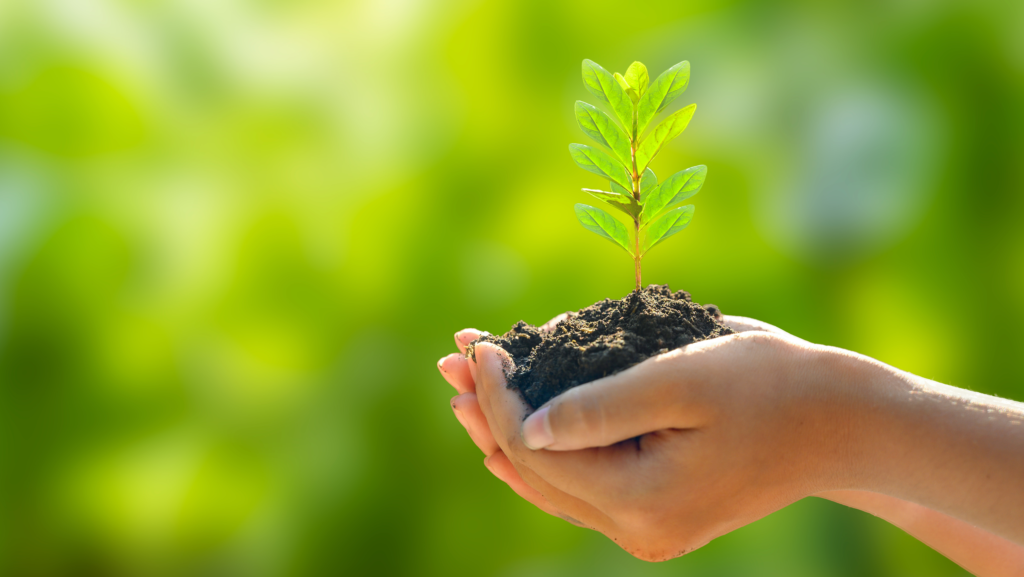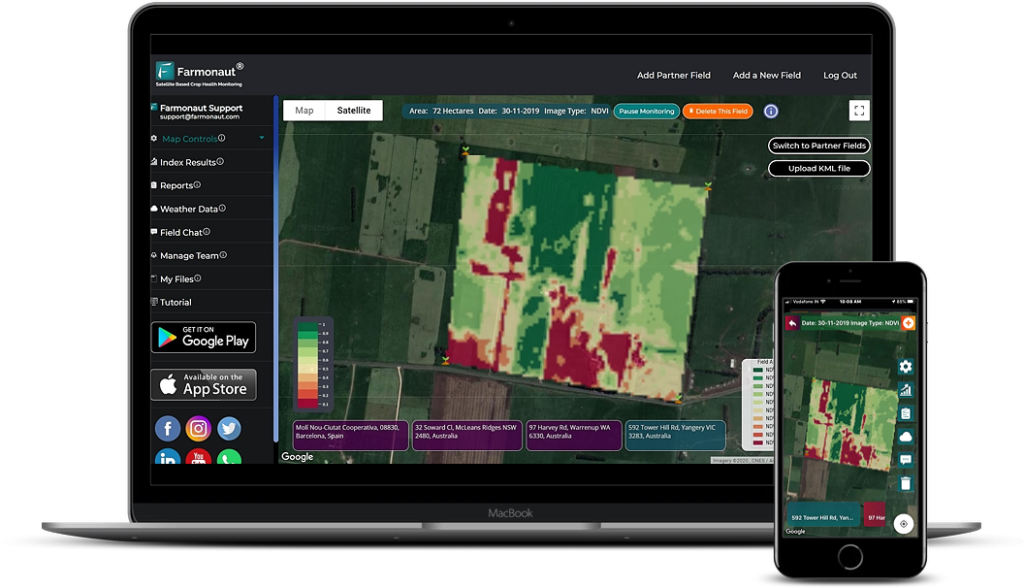Revolutionizing Agriculture: How 5G and Smart Farming Technologies Are Shaping a Sustainable Future
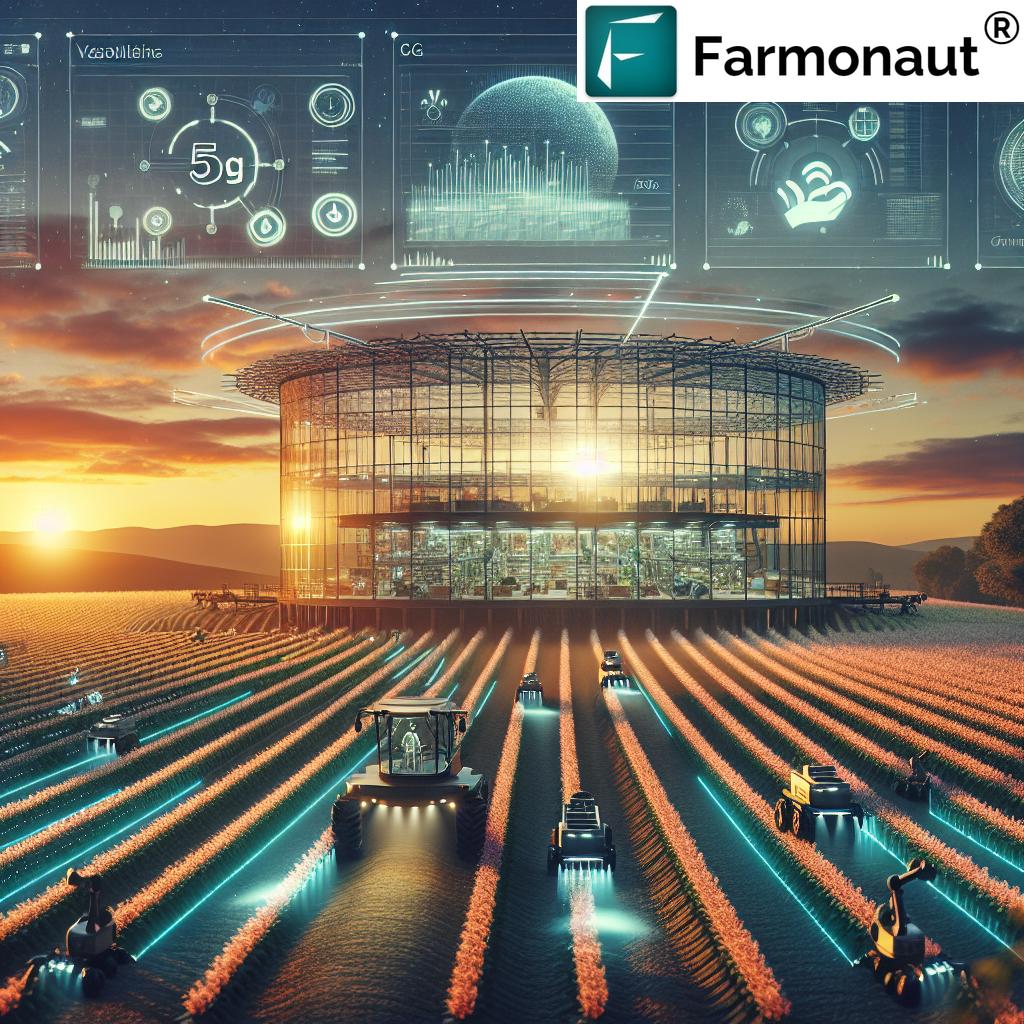
“5G technology in agriculture can increase data transmission speeds by up to 100 times compared to 4G, enabling real-time farm monitoring.”
Welcome to the future of farming! We’re on the brink of an agricultural revolution, where cutting-edge technologies and sustainable practices are converging to reshape how we grow food. In this comprehensive exploration, we’ll delve into the transformative impact of 5G and smart farming technologies on the agricultural landscape. From precision agriculture to AI-powered crop monitoring, we’re witnessing a seismic shift in how we approach food production.
At the forefront of this revolution is Farmonaut, a pioneering agricultural technology company that’s making waves with its innovative digital farming solutions. By leveraging satellite imagery, artificial intelligence, and blockchain technology, Farmonaut is empowering farmers worldwide to make data-driven decisions and optimize their operations.
The Rise of Smart Farming: A Technological Renaissance
Smart farming, also known as precision agriculture, is revolutionizing the agricultural sector by integrating advanced technologies into traditional farming practices. This approach aims to increase crop yields, reduce resource wastage, and promote sustainability. Let’s explore some of the key technologies driving this transformation:
- 5G Connectivity: The backbone of smart farming
- Internet of Things (IoT) Sensors: Gathering real-time data from the field
- Artificial Intelligence and Machine Learning: Analyzing data for actionable insights
- Drones and Satellite Imagery: Providing a bird’s-eye view of crop health
- Robotics and Automation: Streamlining farm operations
5G: The Catalyst for Agricultural Innovation
5G technology is set to revolutionize agriculture by providing ultra-fast, low-latency connectivity that enables real-time data transmission and analysis. This enhanced connectivity is crucial for the seamless operation of smart farming technologies, facilitating instantaneous communication between various farm devices and cloud-based systems.
Key benefits of 5G in agriculture include:
- Improved data collection and analysis
- Enhanced precision in farm operations
- Real-time monitoring and control of agricultural machinery
- Faster response to changing environmental conditions
- Enabling advanced technologies like autonomous tractors and drones
With 5G, farmers can make more informed decisions based on up-to-the-minute data, leading to optimized resource use and increased productivity.
Farmonaut: Pioneering Digital Farming Solutions
Farmonaut is at the forefront of the agritech revolution, offering a comprehensive suite of digital farming solutions that leverage cutting-edge technologies. Their platform provides valuable services such as:
- Satellite-Based Crop Health Monitoring: Using multispectral satellite images to assess vegetation health, soil moisture levels, and other critical metrics
- Jeevn AI Advisory System: An AI-driven tool that delivers personalized farm advice and real-time insights
- Blockchain-Based Product Traceability: Ensuring transparency and security throughout the agricultural supply chain
- Fleet and Resource Management: Optimizing the use of agricultural machinery and resources
- Carbon Footprinting: Helping agribusinesses monitor and reduce their environmental impact
By integrating these advanced technologies, Farmonaut is making precision agriculture more accessible and affordable for farmers worldwide.
The Power of AI in Agriculture
Artificial Intelligence is transforming agriculture by enabling smarter decision-making and more efficient resource management. AI algorithms can analyze vast amounts of data from various sources, including satellite imagery, weather forecasts, and soil sensors, to provide valuable insights for farmers.
Some key applications of AI in agriculture include:
- Predictive analytics for crop yield forecasting
- Early detection of crop diseases and pests
- Optimized irrigation and fertilization schedules
- Automated crop sorting and grading
- Personalized recommendations for crop management
Farmonaut’s Jeevn AI Advisory System exemplifies the power of AI in agriculture, providing farmers with tailored advice based on real-time data analysis.
“AI-powered crop health assessments can detect plant diseases up to 10 days earlier than traditional methods, improving crop yields significantly.”
Drones and Satellite Imagery: A New Perspective on Farming
Drones and satellite imagery are revolutionizing crop monitoring by providing farmers with a comprehensive view of their fields. These technologies enable:
- Precise mapping of crop health and growth patterns
- Early detection of irrigation issues or pest infestations
- Accurate yield predictions
- Targeted application of fertilizers and pesticides
- Monitoring of large areas efficiently
Farmonaut’s satellite-based crop health monitoring system leverages this technology to provide farmers with valuable insights into their crops’ condition, enabling more informed decision-making.
IoT and Smart Sensors: The Eyes and Ears of Modern Farming
Internet of Things (IoT) devices and smart sensors are playing a crucial role in precision agriculture by collecting real-time data on various environmental factors. These devices can monitor:
- Soil moisture and nutrient levels
- Temperature and humidity
- Light intensity and UV radiation
- Crop growth rates
- Weather conditions
By providing accurate, real-time data, IoT sensors enable farmers to make more precise decisions about irrigation, fertilization, and pest control, leading to optimized resource use and improved crop yields.
Explore Farmonaut’s API for integrating satellite and weather data into your agricultural systems
Smart Irrigation Systems: Conserving Water, Boosting Yields
Water scarcity is a growing concern in agriculture, making efficient irrigation crucial for sustainable farming. Smart irrigation systems leverage IoT sensors, weather data, and AI algorithms to optimize water usage. Benefits include:
- Reduced water consumption
- Improved crop health and yields
- Prevention of over-watering and related issues like soil erosion
- Automated irrigation schedules based on real-time data
- Integration with other farm management systems for holistic decision-making
These systems are a prime example of how smart farming technologies can simultaneously improve productivity and promote sustainability.
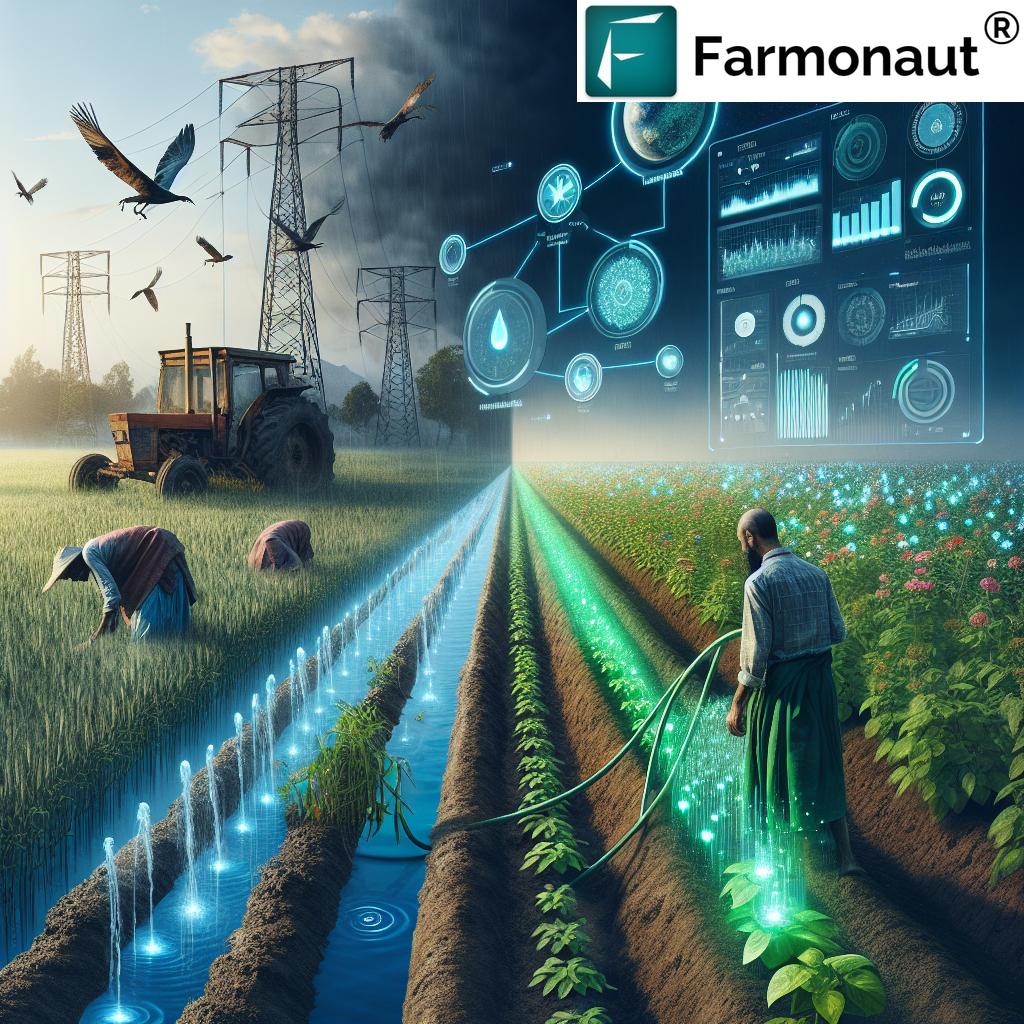
Blockchain in Agriculture: Ensuring Transparency and Traceability
Blockchain technology is making waves in agriculture by providing a secure and transparent way to track products throughout the supply chain. Farmonaut’s blockchain-based traceability solution offers several benefits:
- Enhanced food safety through improved traceability
- Increased consumer trust and brand loyalty
- Reduced fraud and counterfeiting in the supply chain
- Improved inventory management and logistics
- Support for fair trade and sustainable farming practices
By implementing blockchain technology, Farmonaut is helping to create a more transparent and efficient agricultural ecosystem.
Check out Farmonaut’s API Developer Docs for detailed information on integrating our services
Robotics and Automation: The Future of Farm Labor
As labor shortages continue to challenge the agricultural sector, robotics and automation are stepping in to fill the gap. These technologies offer numerous advantages:
- Increased efficiency in planting, harvesting, and processing
- Reduced labor costs and dependency on seasonal workers
- Improved precision in tasks like weeding and pruning
- 24/7 operation capabilities
- Enhanced safety for farm workers
From autonomous tractors to robotic harvesters, these innovations are reshaping the agricultural workforce and boosting productivity.
The Impact of Smart Farming on Sustainability
Smart farming technologies are not just about increasing productivity; they’re also crucial for promoting sustainability in agriculture. Here’s how these innovations are contributing to a more sustainable future:
- Resource Conservation: Precision agriculture techniques reduce water, fertilizer, and pesticide usage
- Reduced Environmental Impact: Optimized farming practices lead to lower greenhouse gas emissions
- Soil Health Improvement: Data-driven decisions help maintain soil quality and reduce erosion
- Biodiversity Protection: Targeted pest management reduces the impact on beneficial insects and wildlife
- Food Waste Reduction: Improved crop monitoring and harvesting techniques minimize post-harvest losses
Farmonaut’s digital farming solutions play a crucial role in this sustainability drive by providing farmers with the tools and data they need to make environmentally conscious decisions.
Empowering Smallholder Farmers with Technology
One of the most significant impacts of smart farming technologies is their potential to empower smallholder farmers. By making advanced agricultural tools more accessible and affordable, companies like Farmonaut are helping to level the playing field. Benefits for smallholder farmers include:
- Access to real-time data and expert advice
- Improved crop yields and income stability
- Reduced risk through better decision-making
- Enhanced market access through improved product quality and traceability
- Increased resilience to climate change impacts
These technologies are not just improving individual livelihoods but also contributing to global food security by boosting productivity among small-scale farmers who produce a significant portion of the world’s food.
The Role of Data in Modern Agriculture
Data is the lifeblood of smart farming, driving informed decision-making and continuous improvement. The agricultural data ecosystem includes:
- Farm-level data from IoT sensors and machinery
- Regional and global data from satellites and weather stations
- Historical crop performance and yield data
- Market trends and pricing information
- Research and best practice databases
Farmonaut’s platform aggregates and analyzes these diverse data sources, providing farmers with actionable insights to optimize their operations.
Overcoming Challenges in Smart Farming Adoption
While the benefits of smart farming are clear, there are still challenges to widespread adoption. These include:
- Initial costs of implementing new technologies
- Need for digital literacy and training among farmers
- Concerns about data privacy and security
- Limited connectivity in rural areas
- Integration with existing farm equipment and practices
Companies like Farmonaut are addressing these challenges by offering affordable, user-friendly solutions and providing support and training to farmers transitioning to digital agriculture.
The Future of Farming: Trends and Predictions
As we look to the future of agriculture, several exciting trends are emerging:
- Vertical Farming: Utilizing urban spaces for efficient, year-round crop production
- Gene Editing: Developing more resilient and nutritious crop varieties
- Autonomous Farm Vehicles: Fully automated planting, tending, and harvesting
- AI-Powered Predictive Analytics: More accurate forecasting of yields, market demands, and climate impacts
- Blockchain-Enabled Smart Contracts: Streamlining agricultural transactions and supply chain management
These innovations, combined with ongoing advancements in 5G and smart farming technologies, promise to create a more efficient, sustainable, and resilient agricultural sector.
Comparing 5G-Enabled Smart Farming Technologies
| Technology | Description | Benefits | Estimated Impact |
|---|---|---|---|
| AI-powered crop monitoring | Uses machine learning to analyze satellite and drone imagery for crop health assessment | Early disease detection, optimized resource allocation | 20-30% increase in crop yields |
| IoT sensors for precision irrigation | Network of soil moisture sensors connected via 5G for real-time water management | Water conservation, improved crop quality | 30-50% reduction in water usage |
| Drone-based field mapping | High-resolution aerial imaging for detailed field analysis and planning | Precise crop monitoring, targeted treatments | 15-25% reduction in pesticide use |
| Smart tractors for automated operations | 5G-connected autonomous vehicles for planting, spraying, and harvesting | Increased efficiency, reduced labor costs | 20-40% reduction in operational costs |
Conclusion: Embracing the Agricultural Revolution
The convergence of 5G technology and smart farming innovations is ushering in a new era of sustainable, efficient, and data-driven agriculture. From AI-powered crop monitoring to blockchain-based supply chain management, these technologies are addressing some of the most pressing challenges facing the agricultural sector.
Farmonaut stands at the forefront of this revolution, offering a comprehensive suite of digital farming solutions that make precision agriculture accessible to farmers of all scales. By leveraging satellite imagery, AI, and blockchain technology, Farmonaut is empowering farmers to make informed decisions, optimize their resources, and contribute to a more sustainable food system.
As we move forward, the continued development and adoption of smart farming technologies will be crucial in meeting the growing global demand for food while minimizing environmental impact. The future of farming is here, and it’s smarter, more sustainable, and more connected than ever before.
FAQ Section
Q: What is precision agriculture?
A: Precision agriculture is an approach to farm management that uses information technology and data analysis to optimize crop yields and reduce resource usage. It involves collecting and analyzing data from various sources to make more informed decisions about planting, irrigation, fertilization, and harvesting.
Q: How does 5G technology benefit agriculture?
A: 5G technology enables faster data transmission, lower latency, and the ability to connect more devices simultaneously. In agriculture, this means real-time monitoring of farm conditions, improved communication between smart farming devices, and the ability to process and act on large amounts of data quickly.
Q: What are some examples of smart farming technologies?
A: Smart farming technologies include IoT sensors for monitoring soil and crop conditions, drones for aerial imaging and crop spraying, AI-powered crop monitoring systems, autonomous farm vehicles, and blockchain-based supply chain management tools.
Q: How does Farmonaut contribute to sustainable agriculture?
A: Farmonaut provides digital farming solutions that help farmers optimize resource use, reduce waste, and make more sustainable decisions. Their satellite-based crop monitoring, AI advisory system, and blockchain traceability solutions contribute to more efficient and environmentally friendly farming practices.
Q: Can small-scale farmers benefit from smart farming technologies?
A: Yes, many smart farming technologies are becoming more accessible and affordable for small-scale farmers. Solutions like Farmonaut’s platform provide valuable insights and tools that can help smallholder farmers improve their yields, reduce costs, and compete more effectively in the market.





